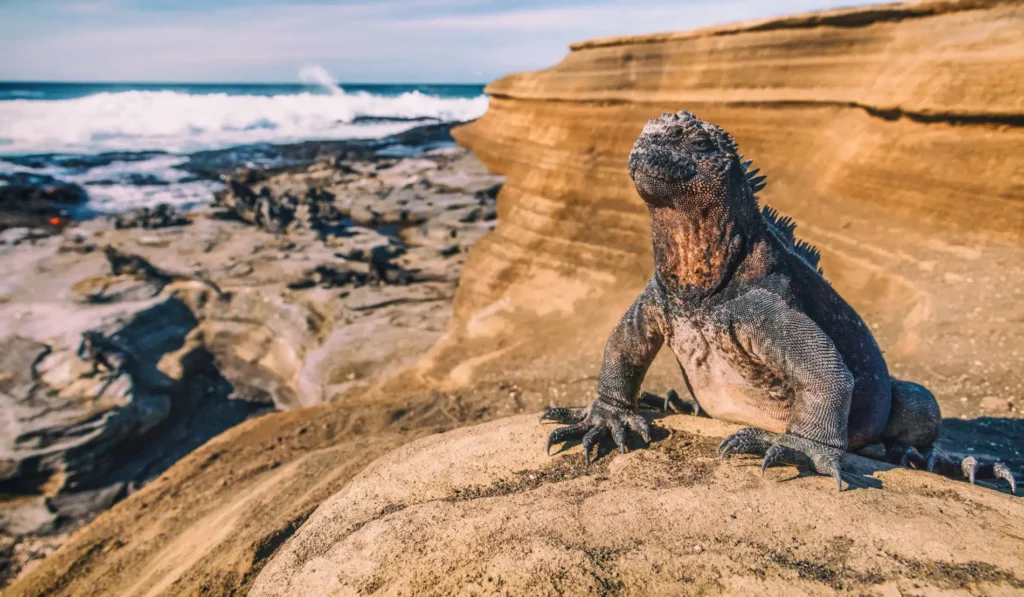The Galapagos Islands are a volcanic archipelago located in the Pacific Ocean, about 1,000 kilometers off the coast of Ecuador, the country to which they belong. Comprising 18 main islands and several smaller islets, the archipelago is famous for its remarkable biological diversity and is one of the most iconic destinations for scientific studies in biology and ecology.
What makes the Galapagos Islands truly unique is their geological history and isolation. The islands emerged from volcanic eruptions millions of years ago and, due to their distance from the mainland and relative inaccessibility, developed an extraordinary variety of endemic species. It was in this environment that British naturalist Charles Darwin developed his theory of evolution by natural selection after his visit to the islands in 1835.
The wildlife of the Galapagos Islands is remarkable. From sea lions to giant tortoises, marine iguanas, and a variety of seabirds, the islands are home to a wealth of species that are not found anywhere else in the world. These creatures evolved in isolated environments, resulting in unique adaptations and fascinating behaviors.

In addition to their scientific importance, the Galapagos Islands are also a popular tourist destination, attracting visitors from all over the world who want to explore their natural beauty and dive into their crystal-clear waters. However, the increase in tourism has brought conservation challenges, leading Ecuadorian authorities to implement measures to protect the islands’ fragile ecosystem.
Today, the Galapagos Islands remain a living laboratory for scientific studies and a symbol of the importance of biodiversity conservation. Their status as a UNESCO World Heritage Site and the ongoing work of conservation organizations ensure that this unique natural treasure is protected for future generations.
However, the Galapagos Islands are now facing the challenge of tourist overcrowding. In response to these concerns, the Ecuadorian Ministry of Tourism announced a significant adjustment in entry fees, which will take effect on August 1, 2024.
Visitors will now face a substantial increase, doubling the entry fee to up to $200. However, a discount policy has been established for citizens of Mercosur countries, such as Argentina, Brazil, and Peru. These visitors will receive a discount, paying a reduced fee of $100 per person. Despite the increase, it is important to note that children under two years old will have free entry, regardless of nationality.
This move marks the first increase in entry fees to the Galapagos since 1998 and is a crucial measure to mitigate the pressure on this ecologically sensitive destination. With these new fees, it is expected that visitation will be managed more sustainably, ensuring the preservation of these unique islands for future generations.
“The Galapagos Islands are not only a national treasure but also a global one. It is our collective responsibility to protect and preserve this unparalleled ecosystem for future generations,” said Niels Olsen, Ecuador’s Minister of Tourism, in a statement shared with the Galapagos Conservation Trust.
Olsen emphasized that the financial increase from ticket sales will be directed to conservation initiatives on the islands, located 1,000 kilometers off the coast of mainland Ecuador.
The Galapagos boast UNESCO World Heritage status, comprising more than 100 islands. Known as a “living museum,” these islands are home to a rich diversity of plants and animals, many of which are rare or face extinction threats.
Although only about 30,000 people reside in the Galapagos Islands, approximately 170,000 tourists visit them annually, highlighting the importance of management measures to balance environmental preservation with sustainable tourism.
The Galapagos Conservation Trust (GCT) is a registered charity in the UK dedicated to promoting conservation and sustainability in the Galapagos Islands. Founded in 1995, GCT works closely with local partners, government authorities, scientists, and communities to protect the islands’ fragile ecosystem and unique species.
GCT’s mission is to support conservation, research, and education projects in the Galapagos, aiming to ensure that these islands continue to be an example of biodiversity and a living laboratory for scientific studies. The organization operates on several fronts, from funding conservation and research projects to engaging local communities and supporting environmental education.
Among GCT’s areas of focus are protecting the Galapagos’ endemic wildlife, preserving natural habitats, mitigating environmental threats such as the introduction of invasive species and pollution, and developing sustainable tourism practices. The organization also plays a crucial role in raising public awareness about the importance of the Galapagos and mobilizing support for its causes.
GCT operates through donations, project funding, partnerships, and volunteer programs, working tirelessly to ensure that the Galapagos Islands continue to thrive as one of the world’s most remarkable and iconic ecosystems. Their work plays a vital role in protecting this natural heritage for present and future generations.
“In recent years, we have witnessed a worrying increase in the number of visitors to the islands, driven by a sharp rise in land-based tourism,” the organization reported on its website.
“This is pushing waste management systems to their limits, exacerbating water and food insecurity, and increasing the threat of introducing devastating invasive species to the islands,” it added.
These alerts highlight the critical importance of sustainable tourism approaches and conservation measures to protect the precious biodiversity and fragile ecosystems of the Galapagos Islands.
Despite the challenges faced, the Galapagos Islands remain a place of significant scientific discoveries. Last year, researchers found a previously unknown coral reef, believed to be thousands of years old.
In 2021, UNESCO released a report addressing the state of conservation activities in the region. The report praised the Ecuadorian government for its efforts in reducing illegal fishing and controlling the spread of invasive species, though it requested an update by 2024.
The global visibility of the destination may increase this year with the release of a new film directed by Ron Howard. The film, titled “Eden,” explores a true story of scandal, sexual liberation, and murder that occurred on one of the Galapagos Islands in the 1930s. Starring Sydney Sweeney, Vanessa Kirby, Ana de Armas, and Jude Law, “Eden” promises to bring a fascinating narrative set in this unique setting.

